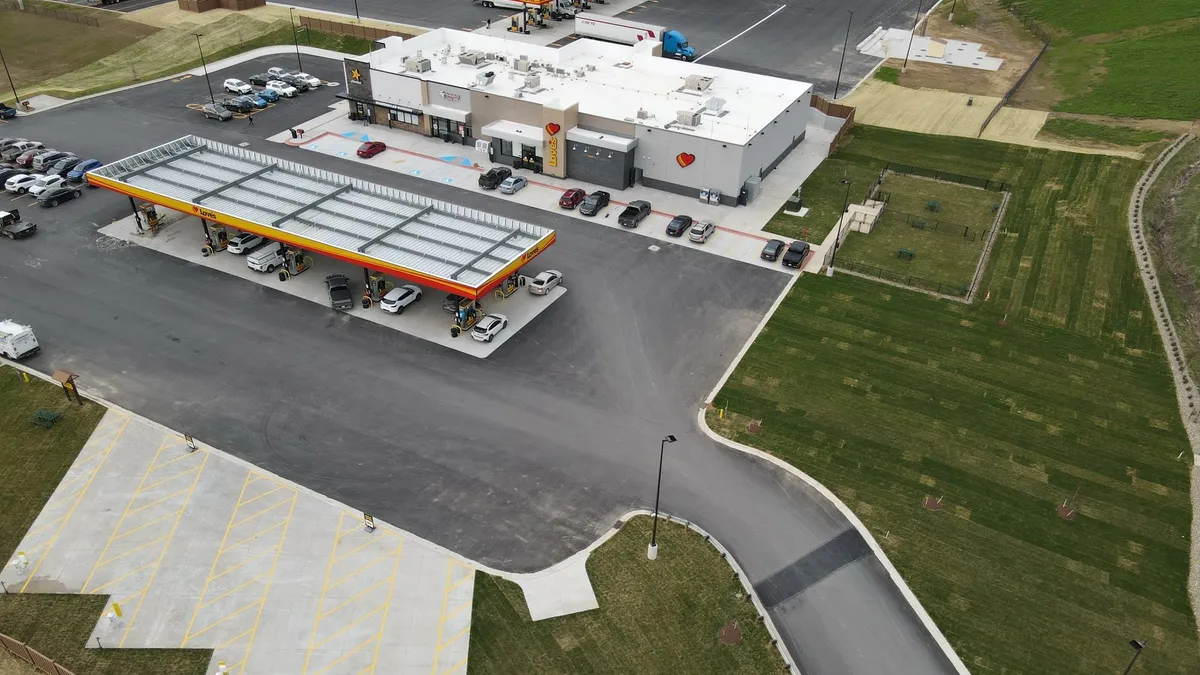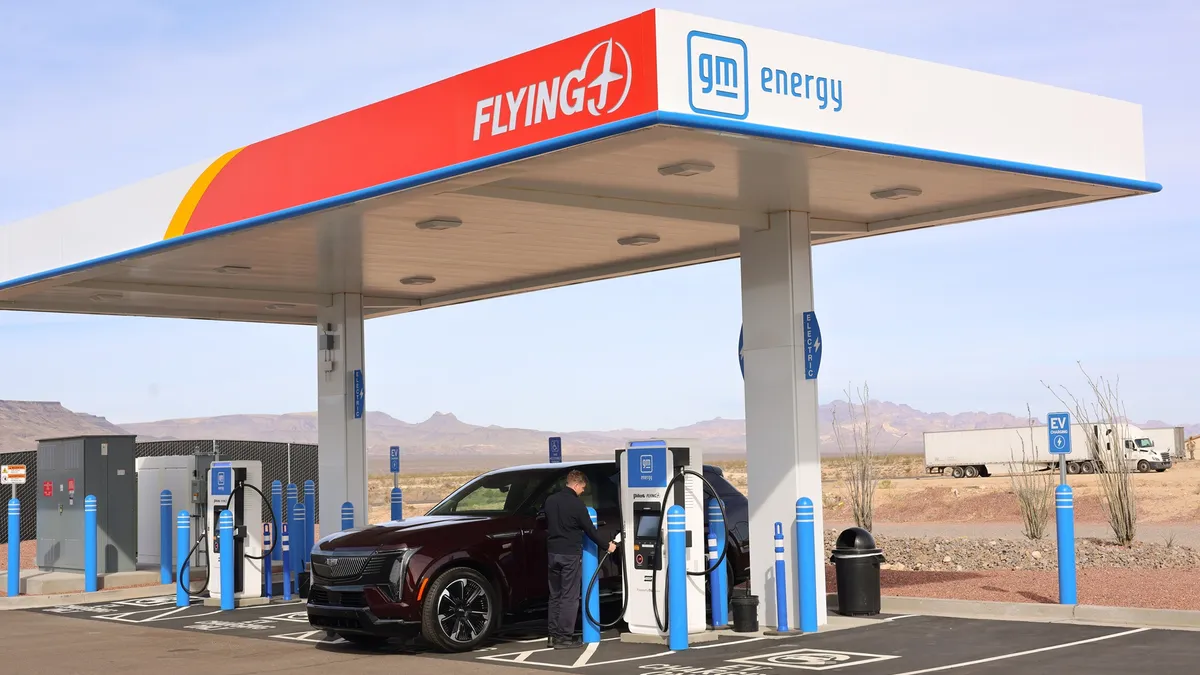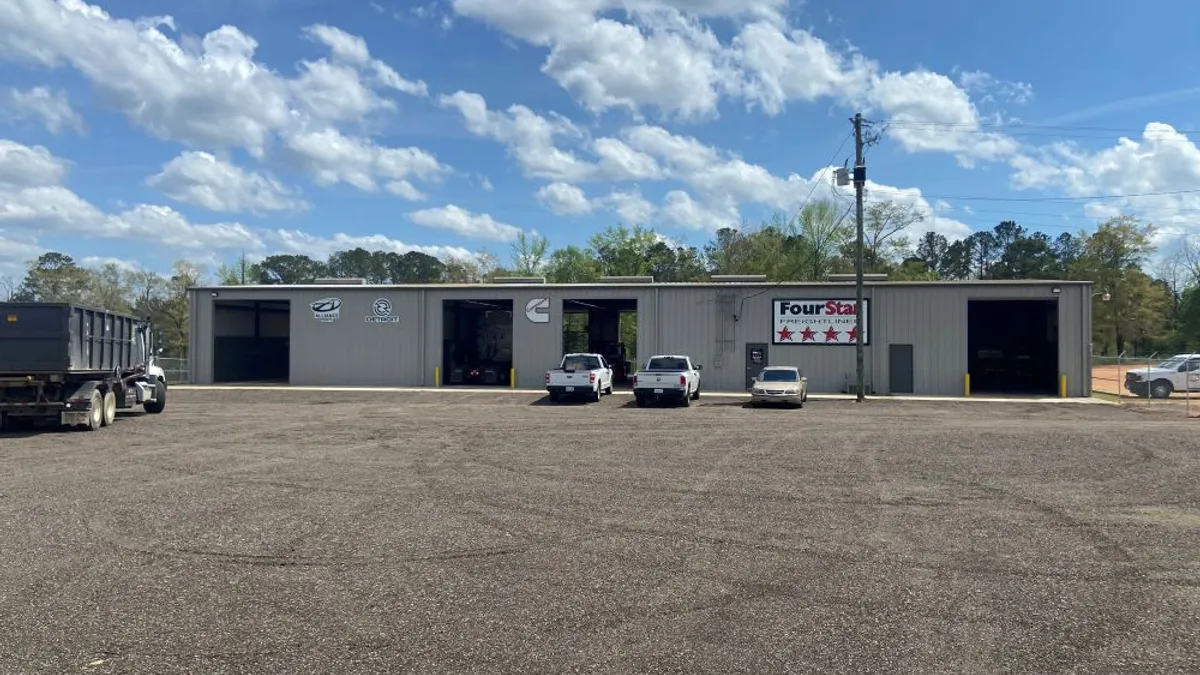A downturn in the trucking spot market has some experts warning of a looming freight recession. But should trucking be bracing for a downturn — or renewed interest in the contract market?
A drop in the spot market's load-to-truck ratio indicates lower demand for trucks. Still, it's "not unusual to see load-posting volumes dip at this time of year," according to a DAT analysis, as this is the time of year "when long-term freight contracts kick in for bigger carriers."
Still, the decline in spot rates have alarmed some analysts, who have pressed carriers on how they would respond if demand falls. The potential of a freight recession comes as many fleets are still struggling with driver recruitment and face higher labor, fuel and equipment costs.
"What will be interesting to see is how these companies can manage their cost structures with increasing costs and buying equipment while we see, potentially, a resetting of the market down," said Jim Nicholson, senior vice president of operations at freight technology company Loadsmart.
Here is a look at what some major U.S. carriers are telling investors about what they’ve seen in the past quarter — and how they expect to fare in the event of a market downturn.
XPO
Mario Harik, CIO and acting president of LTL for XPO, said contract rates rose YoY in Q1, though rate increases are "nowhere near" the levels seen in 2021.
From a volume standpoint, Harik said XPO expects tonnage to fall by a few percentage points in Q2, and then recover quickly in future quarters.
"It’s fair to say that there are crosswinds in the freight environment," Harik said on a May 10 earnings call. Customers told XPO the projected decline in volume was due both to lockdowns in China limiting the flow of goods into the U.S., as well as material shortages hampering production. "As these dynamics abate, and they will, these will become natural tailwinds for us in the back half of the year.
Werner
A fallout is coming for the "explosion of single-vehicle registrants" that emerged to chase opportunities in an overheated spot market, said Derek Leathers, chairman, president and CEO of Werner, on a May 3 earnings call.
"I think the washout will be severe," Leathers said. "And I think the conversation about whether there is or isn’t going to be a bloodbath, it’s hard to ignore the fact that 90% of the industry is 20 trucks or less, and there’s going to be blood in the water at that level."
Larger fleets less exposed to the contract market are in better shape. Leathers said shippers have moved freight "aggressively" from the spot market to contracts in a bid for stability.
"We didn’t go out and buy dramatically more expensive used equipment in a market and chase spot rates with that equipment," Leathers said. "We stay true to who we are."
Saia
"Dark clouds on the horizon" in the industry could present acquisition opportunities for well-positioned companies like Saia, Executive Vice President and CFO Doug Col said on a May 2 earnings call.
"Historically in our industry, those have always presented opportunity for the healthy companies," Col said. "And we're in a really fortunate position whichever way the things go from here, I think you'd see us be in a position to take advantage of it."
Col noted that in the event of a downturn, the company could look to acquire a struggling competitor or pick up terminals. Saia has been looking to aggressively buy real estate, with plans to open between 10 and 15 new terminals this year, and the aim to own rather than lease facility land.
ArcBest
While the spot truckload market is softening, cyclical downturns typically don't affect ArcBest as much as other carriers because of its wide range of services, Danny Loe, president of asset-light logistics and chief yield officer, said on the company's Q1 earnings call April 29.
"I think if you listen to our competitors on the other calls, there's definitely been a softening in the spot truckload market," Loe said. "And so we acknowledge that and see that. But we're confident in our ability that when we have multiple solutions … to provide the right answers to our customer."
Following the acquisition of TL broker MoLo last year, ArcBest is better suited to grow the contract portion of its TL business "through kind of a deflationary-type truckload market," said David Humphrey, vice president of investor relations. Customer demand remains high despite ongoing shortages and backlogs in shippers' supply chains, Humphrey added.
Old Dominion Freight Line
Demand remains strong for Old Dominion, and the carrier doesn’t plan to slow its capacity investments — even in the event of a market downturn, executives said during a Q1 earnings call April 27.
CEO Greg C. Gantt told investors the LTL carrier would be remiss not to use any recession to buy land in expensive markets or explore other expansion opportunities at lower prices.
“Sometimes in a downturn, it provides the best opportunity for you to go out and do some things in certain markets that are extremely difficult,” Gantt said. “And that may present an opportunity for us.”
“When those opportunities are there, you've got to strike and you’ve got to take advantage of them,” Gantt added.
Old Dominion’s network expansion investments during a 2016 slowdown set the stage for revenue growth in 2017 and 2018, and its spending in 2019 contributed to the carrier’s record growth last year and in Q1, CFO Adam Satterfield said.
“It takes investment during those slower times to build up that excess capacity to be able to participate in these really strong market environments,” Satterfield said. “And I think that's why you've seen us have a little different performance.”
Heartland Express
Freight demand was strong — albeit down YoY — during Q1, Heartland Express CEO Mike Gerdin said in an earnings statement on April 21. Hiring and retention remain obstacles for Heartland as well as the rest of the industry, Gerdin said.
"We continue to have significantly more opportunities to haul freight than we are able to cover with our existing fleet and available drivers," Gerdin said.
Based on Heartland's experience and customer feedback, the carrier expects "volatile freight demand throughout 2022 but at volumes that will continue to exceed our available capacity."
Landstar System
Landstar’s truckload volumes increased 20% YoY in Q1, CEO Jim Gattoni said during an earnings call on April 21.
Gattoni expects the strong freight environment to continue, "although at a decelerated rate of YoY growth as compared to the previous seven quarters," he told analysts on the call.
The CEO noted signs of softening in the spot market but said Landstar’s structure, with shippers hauling its trailers, leaves it less exposed to fluctuations. “There's more stickiness in our model than a true spot market, even though we work in the spot market. We do have dedicated customers, we have [shippers] hauling in those routes."
"What everybody's struggling with is, if the cycle’s down, how far does the cycle go down?" Gattoni said.
Knight-Swift Transportation
Knight-Swift President and CEO David Jackson downplayed fears of a freight recession during the company's Q1 earnings call on April 20, noting the various structural factors at play.
One of those structural challenges is equipment. Jackson told analysts the inability to receive trucks and trailers was having a ripple effect on the industry. If large carriers are holding on to old equipment and not selling it as they usually do, small carriers face higher financial costs when they want to add capacity. It's a problem that could still be exacerbated if banks tighten their financial rules out of fears of a market downturn.
"I would say that watching what's happening with equipment is maybe the most valuable thing we can look at for the crystal ball for full truckload," Jackson said.
Seasonality is also playing a big role in the market, according to Jackson, as the industry returns to an era of "ebbs and flows" after more than a year of elevated demand.
"I think when we look at what's happened most recently in freight rates and the reports of the death of the freight market — which have been greatly exaggerated — I think what we're seeing is a little bit of seasonality," said Jackson.
In the past 18 months trucking markets have operated with extreme urgency as shippers rush to meet inventory deadlines amid supply chain delays, he said. That urgency creates a situation in which carriers are accepting live load and live unload shipments at high rates.
"Of course that's going to be the first step to go away," Jackson said. "So I think it's a little early to try and call the defeat in the overall market given what I shared about equipment. But that being said, our business is prepared and it's been years in the making to weather whatever cycles might come our way in the future.
J.B. Hunt Transport Services
J.B. Hunt saw spot growth ease in Q1, though noted it's seen higher demand for contractual truckload services. The carrier's contractual business grew more than 20%, while spot growth "was at the low single digits," Brad Hicks, president of highway services, said during an earnings call on April 18.
"We have seen a moderation in spot opportunities as of late, which we attribute partly to more customers shifting freight out of the spot market into published or contractual business," Hicks said.
Still, Chief Commercial Officer Shelley Simpson acknowledged there are "varying signals in the market" that point to a potential freight recession in the future. Executives said the carrier's strong bid season and its diversified range of services would insulate the company in the case of a downturn.
"I just think we have a lot of flexibility, depends on one of the four channels that we have and we can adjust our cost when we have the non-asset side," said Nick Hobbs, COO and president of contract services. "But on the asset side, we have contracts in place that help protect us there as the volume changes. So, we feel good about that."
Max Garland, Edwin Lopez, Kate Magill and Sarah Zimmerman contributed to this story.





















